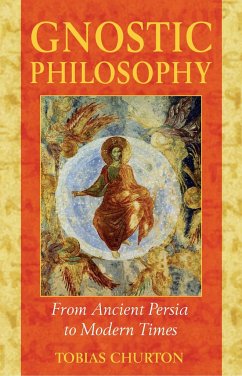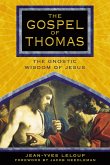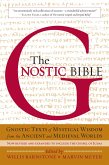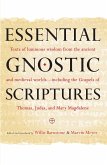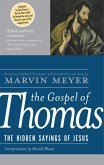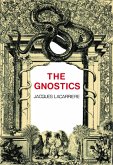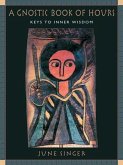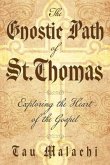- Broschiertes Buch
- Merkliste
- Auf die Merkliste
- Bewerten Bewerten
- Teilen
- Produkt teilen
- Produkterinnerung
- Produkterinnerung
The founding editor of "Freemasonry Today" offers an extensive examination of the history of gnosticism and how its philosophy has influenced the Western esoteric tradition.
Andere Kunden interessierten sich auch für
![The Gospel of Thomas The Gospel of Thomas]() Jean-Yves LeloupThe Gospel of Thomas17,99 €
Jean-Yves LeloupThe Gospel of Thomas17,99 €![The Gnostic Bible: Revised and Expanded Edition The Gnostic Bible: Revised and Expanded Edition]() The Gnostic Bible: Revised and Expanded Edition43,99 €
The Gnostic Bible: Revised and Expanded Edition43,99 €![Essential Gnostic Scriptures: Texts of Luminous Wisdom from the Ancient and Medieval Worlds?including the Gospels of Thomas, Judas, and Mary Magdale Essential Gnostic Scriptures: Texts of Luminous Wisdom from the Ancient and Medieval Worlds?including the Gospels of Thomas, Judas, and Mary Magdale]() Marvin MeyerEssential Gnostic Scriptures: Texts of Luminous Wisdom from the Ancient and Medieval Worlds?including the Gospels of Thomas, Judas, and Mary Magdale25,99 €
Marvin MeyerEssential Gnostic Scriptures: Texts of Luminous Wisdom from the Ancient and Medieval Worlds?including the Gospels of Thomas, Judas, and Mary Magdale25,99 €![The Gospel of Thomas The Gospel of Thomas]() Marvin MeyerThe Gospel of Thomas25,99 €
Marvin MeyerThe Gospel of Thomas25,99 €![The Gnostics The Gnostics]() Jacques LacarriereThe Gnostics17,99 €
Jacques LacarriereThe Gnostics17,99 €![A Gnostic Book of Hours A Gnostic Book of Hours]() June K. SingerA Gnostic Book of Hours25,99 €
June K. SingerA Gnostic Book of Hours25,99 €![The Gnostic Path of St. Thomas The Gnostic Path of St. Thomas]() Tau Tau MalachiThe Gnostic Path of St. Thomas30,99 €
Tau Tau MalachiThe Gnostic Path of St. Thomas30,99 €-
-
-
The founding editor of "Freemasonry Today" offers an extensive examination of the history of gnosticism and how its philosophy has influenced the Western esoteric tradition.
Hinweis: Dieser Artikel kann nur an eine deutsche Lieferadresse ausgeliefert werden.
Hinweis: Dieser Artikel kann nur an eine deutsche Lieferadresse ausgeliefert werden.
Produktdetails
- Produktdetails
- Verlag: Inner Traditions Bear and Company
- 2nd Original edition
- Seitenzahl: 480
- Erscheinungstermin: 1. März 2005
- Englisch
- Abmessung: 228mm x 155mm x 33mm
- Gewicht: 584g
- ISBN-13: 9781594770357
- ISBN-10: 1594770352
- Artikelnr.: 22264506
- Herstellerkennzeichnung
- Produktsicherheitsverantwortliche/r
- Europaallee 1
- 36244 Bad Hersfeld
- gpsr@libri.de
- Verlag: Inner Traditions Bear and Company
- 2nd Original edition
- Seitenzahl: 480
- Erscheinungstermin: 1. März 2005
- Englisch
- Abmessung: 228mm x 155mm x 33mm
- Gewicht: 584g
- ISBN-13: 9781594770357
- ISBN-10: 1594770352
- Artikelnr.: 22264506
- Herstellerkennzeichnung
- Produktsicherheitsverantwortliche/r
- Europaallee 1
- 36244 Bad Hersfeld
- gpsr@libri.de
Tobias Churton is Britain’s leading scholar of Western Esotericism, a world authority on Gnosticism, Hermeticism, and Rosicrucianism. He is a filmmaker and the founding editor of the magazine Freemasonry Today. An Honorary Fellow of Exeter University, where he is faculty lecturer in Rosicrucianism and Freemasonry, he holds a master’s degree in Theology from Brasenose College, Oxford, and created the award-winning documentary series and accompanying book The Gnostics, as well as several other films on Christian doctrine, mysticism, and magical folklore. The author of many books, including Gnostic Philosophy, The Invisible History of the Rosicrucians, and Aleister Crowley: The Beast in Berlin, he lives in England.
Gnostic Philosophy
From Ancient Persia to Modern Times
Foreword by Christopher McIntosh
Acknowledgments
Introduction
Part one--Antiquity
1--Before the Gnostics
Also Sprach Zarathushtra
The Wise Lord
That Old Devil Time
Mithra the Mediator
Enter the Demiurge
2--From the Magi to St. Paul
Jewish Themes
The Anthropos: Man
Sophia
The Unknown God and the Demiurge
Philo of Alexandria
The Essenes
The Book of Enoch
Life at the Dead Sea
Jesus
Stone Theology
Paul
3--The First Gnostics
Gnosticism
Hans Jonas: The Gnostic Religion
The Irresistible Character of Gnosis; or, “The Spirit Is Willing”
Being Is Seeing
Clement of Alexandria: The Gnosis Truly So-called?
Part two--The Middle Ages
4--Magic in the Middle Ages
Neoplatonic Theurgy
Celestial Hierarchies
Light Metaphysics
After the Pact
Kabbalistic Magic
Roger Bacon
5--The Sufis
The Insights of Sufism
Sufis and Philosophy
Maulana Jalal-ud-din Rumi: Sufi Master
Interesting Times
6--The Troubadours
Prologue: The Two Worlds
What Is a Troubadour?
Miraval
The Ladies in His Life
Loba
The Rules of Love: Miraval’s Guide to Successful Courtship
Was the Fine Love a Spiritual Love?
The Allegory of Love
Troubadours and Cathars
The Last Song
The Joy That We Have Lost
Creation Is the Product of Pain
Were the Troubadours Sexual Mystics?
7--The Knights Templar
Templars and Cathars
The Templars and the Gral
Baphomet
Templars in Search of the Stones
Kilwinning
Conclusion: Gnostics in the Temple?
Part three--Enlightenment
8--Jacob Böhme’s Theosophick Cosmos
Böhme’s Life
Elements of Böhme’s Theosophy
The Influence of Jacob Böhme
William Law
Romantic Philosophy
The Neo-Rosicrucians
William Blake
9--Germany 1710-1800: The Return of the Rosy Cross
The Gold und Rosenkreuzers
Masonry in Germany
Radicals Under Attack: Gold und Rosenkreuz vs. the Illuminati
A Real Rosicrucian King (on the Throne of Prussia)
Rosicrucians in Poland
Russia
The Asiatic Brethren
Romanticism
10--Freemasonry in France
The Elect Cohens
Éliphas Lévi Zahed: A Great Socialist Magician and Occult Revivalist
Lévi’s Legacy
Magic Revives in France
Part Four--The Modern Age
11--A New Aeon: Aleister Crowley
Aiwass: Messenger of the Gods
The Book of the Law
The Crisis
Aleister Crowley: Sex Magician
Sexual Alchemy
12--Light in the Jar
Carl Jung
13--Gnosis and the New Physics
The Copenhagen Interpretation
14--Gnosis Today: A Personal View
Rudolf Steiner
Gnosis and Ecology
Neo-Gnostics
Cinema
Hipgnostics: Popular Music
The Arts
Notes
Bibliography
Index
From Ancient Persia to Modern Times
Foreword by Christopher McIntosh
Acknowledgments
Introduction
Part one--Antiquity
1--Before the Gnostics
Also Sprach Zarathushtra
The Wise Lord
That Old Devil Time
Mithra the Mediator
Enter the Demiurge
2--From the Magi to St. Paul
Jewish Themes
The Anthropos: Man
Sophia
The Unknown God and the Demiurge
Philo of Alexandria
The Essenes
The Book of Enoch
Life at the Dead Sea
Jesus
Stone Theology
Paul
3--The First Gnostics
Gnosticism
Hans Jonas: The Gnostic Religion
The Irresistible Character of Gnosis; or, “The Spirit Is Willing”
Being Is Seeing
Clement of Alexandria: The Gnosis Truly So-called?
Part two--The Middle Ages
4--Magic in the Middle Ages
Neoplatonic Theurgy
Celestial Hierarchies
Light Metaphysics
After the Pact
Kabbalistic Magic
Roger Bacon
5--The Sufis
The Insights of Sufism
Sufis and Philosophy
Maulana Jalal-ud-din Rumi: Sufi Master
Interesting Times
6--The Troubadours
Prologue: The Two Worlds
What Is a Troubadour?
Miraval
The Ladies in His Life
Loba
The Rules of Love: Miraval’s Guide to Successful Courtship
Was the Fine Love a Spiritual Love?
The Allegory of Love
Troubadours and Cathars
The Last Song
The Joy That We Have Lost
Creation Is the Product of Pain
Were the Troubadours Sexual Mystics?
7--The Knights Templar
Templars and Cathars
The Templars and the Gral
Baphomet
Templars in Search of the Stones
Kilwinning
Conclusion: Gnostics in the Temple?
Part three--Enlightenment
8--Jacob Böhme’s Theosophick Cosmos
Böhme’s Life
Elements of Böhme’s Theosophy
The Influence of Jacob Böhme
William Law
Romantic Philosophy
The Neo-Rosicrucians
William Blake
9--Germany 1710-1800: The Return of the Rosy Cross
The Gold und Rosenkreuzers
Masonry in Germany
Radicals Under Attack: Gold und Rosenkreuz vs. the Illuminati
A Real Rosicrucian King (on the Throne of Prussia)
Rosicrucians in Poland
Russia
The Asiatic Brethren
Romanticism
10--Freemasonry in France
The Elect Cohens
Éliphas Lévi Zahed: A Great Socialist Magician and Occult Revivalist
Lévi’s Legacy
Magic Revives in France
Part Four--The Modern Age
11--A New Aeon: Aleister Crowley
Aiwass: Messenger of the Gods
The Book of the Law
The Crisis
Aleister Crowley: Sex Magician
Sexual Alchemy
12--Light in the Jar
Carl Jung
13--Gnosis and the New Physics
The Copenhagen Interpretation
14--Gnosis Today: A Personal View
Rudolf Steiner
Gnosis and Ecology
Neo-Gnostics
Cinema
Hipgnostics: Popular Music
The Arts
Notes
Bibliography
Index
Gnostic Philosophy
From Ancient Persia to Modern Times
Foreword by Christopher McIntosh
Acknowledgments
Introduction
Part one--Antiquity
1--Before the Gnostics
Also Sprach Zarathushtra
The Wise Lord
That Old Devil Time
Mithra the Mediator
Enter the Demiurge
2--From the Magi to St. Paul
Jewish Themes
The Anthropos: Man
Sophia
The Unknown God and the Demiurge
Philo of Alexandria
The Essenes
The Book of Enoch
Life at the Dead Sea
Jesus
Stone Theology
Paul
3--The First Gnostics
Gnosticism
Hans Jonas: The Gnostic Religion
The Irresistible Character of Gnosis; or, “The Spirit Is Willing”
Being Is Seeing
Clement of Alexandria: The Gnosis Truly So-called?
Part two--The Middle Ages
4--Magic in the Middle Ages
Neoplatonic Theurgy
Celestial Hierarchies
Light Metaphysics
After the Pact
Kabbalistic Magic
Roger Bacon
5--The Sufis
The Insights of Sufism
Sufis and Philosophy
Maulana Jalal-ud-din Rumi: Sufi Master
Interesting Times
6--The Troubadours
Prologue: The Two Worlds
What Is a Troubadour?
Miraval
The Ladies in His Life
Loba
The Rules of Love: Miraval’s Guide to Successful Courtship
Was the Fine Love a Spiritual Love?
The Allegory of Love
Troubadours and Cathars
The Last Song
The Joy That We Have Lost
Creation Is the Product of Pain
Were the Troubadours Sexual Mystics?
7--The Knights Templar
Templars and Cathars
The Templars and the Gral
Baphomet
Templars in Search of the Stones
Kilwinning
Conclusion: Gnostics in the Temple?
Part three--Enlightenment
8--Jacob Böhme’s Theosophick Cosmos
Böhme’s Life
Elements of Böhme’s Theosophy
The Influence of Jacob Böhme
William Law
Romantic Philosophy
The Neo-Rosicrucians
William Blake
9--Germany 1710-1800: The Return of the Rosy Cross
The Gold und Rosenkreuzers
Masonry in Germany
Radicals Under Attack: Gold und Rosenkreuz vs. the Illuminati
A Real Rosicrucian King (on the Throne of Prussia)
Rosicrucians in Poland
Russia
The Asiatic Brethren
Romanticism
10--Freemasonry in France
The Elect Cohens
Éliphas Lévi Zahed: A Great Socialist Magician and Occult Revivalist
Lévi’s Legacy
Magic Revives in France
Part Four--The Modern Age
11--A New Aeon: Aleister Crowley
Aiwass: Messenger of the Gods
The Book of the Law
The Crisis
Aleister Crowley: Sex Magician
Sexual Alchemy
12--Light in the Jar
Carl Jung
13--Gnosis and the New Physics
The Copenhagen Interpretation
14--Gnosis Today: A Personal View
Rudolf Steiner
Gnosis and Ecology
Neo-Gnostics
Cinema
Hipgnostics: Popular Music
The Arts
Notes
Bibliography
Index
From Ancient Persia to Modern Times
Foreword by Christopher McIntosh
Acknowledgments
Introduction
Part one--Antiquity
1--Before the Gnostics
Also Sprach Zarathushtra
The Wise Lord
That Old Devil Time
Mithra the Mediator
Enter the Demiurge
2--From the Magi to St. Paul
Jewish Themes
The Anthropos: Man
Sophia
The Unknown God and the Demiurge
Philo of Alexandria
The Essenes
The Book of Enoch
Life at the Dead Sea
Jesus
Stone Theology
Paul
3--The First Gnostics
Gnosticism
Hans Jonas: The Gnostic Religion
The Irresistible Character of Gnosis; or, “The Spirit Is Willing”
Being Is Seeing
Clement of Alexandria: The Gnosis Truly So-called?
Part two--The Middle Ages
4--Magic in the Middle Ages
Neoplatonic Theurgy
Celestial Hierarchies
Light Metaphysics
After the Pact
Kabbalistic Magic
Roger Bacon
5--The Sufis
The Insights of Sufism
Sufis and Philosophy
Maulana Jalal-ud-din Rumi: Sufi Master
Interesting Times
6--The Troubadours
Prologue: The Two Worlds
What Is a Troubadour?
Miraval
The Ladies in His Life
Loba
The Rules of Love: Miraval’s Guide to Successful Courtship
Was the Fine Love a Spiritual Love?
The Allegory of Love
Troubadours and Cathars
The Last Song
The Joy That We Have Lost
Creation Is the Product of Pain
Were the Troubadours Sexual Mystics?
7--The Knights Templar
Templars and Cathars
The Templars and the Gral
Baphomet
Templars in Search of the Stones
Kilwinning
Conclusion: Gnostics in the Temple?
Part three--Enlightenment
8--Jacob Böhme’s Theosophick Cosmos
Böhme’s Life
Elements of Böhme’s Theosophy
The Influence of Jacob Böhme
William Law
Romantic Philosophy
The Neo-Rosicrucians
William Blake
9--Germany 1710-1800: The Return of the Rosy Cross
The Gold und Rosenkreuzers
Masonry in Germany
Radicals Under Attack: Gold und Rosenkreuz vs. the Illuminati
A Real Rosicrucian King (on the Throne of Prussia)
Rosicrucians in Poland
Russia
The Asiatic Brethren
Romanticism
10--Freemasonry in France
The Elect Cohens
Éliphas Lévi Zahed: A Great Socialist Magician and Occult Revivalist
Lévi’s Legacy
Magic Revives in France
Part Four--The Modern Age
11--A New Aeon: Aleister Crowley
Aiwass: Messenger of the Gods
The Book of the Law
The Crisis
Aleister Crowley: Sex Magician
Sexual Alchemy
12--Light in the Jar
Carl Jung
13--Gnosis and the New Physics
The Copenhagen Interpretation
14--Gnosis Today: A Personal View
Rudolf Steiner
Gnosis and Ecology
Neo-Gnostics
Cinema
Hipgnostics: Popular Music
The Arts
Notes
Bibliography
Index

